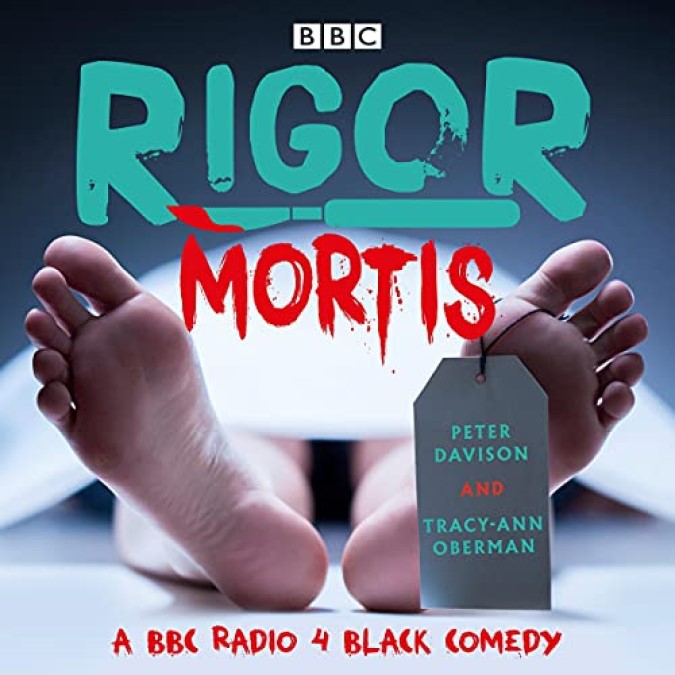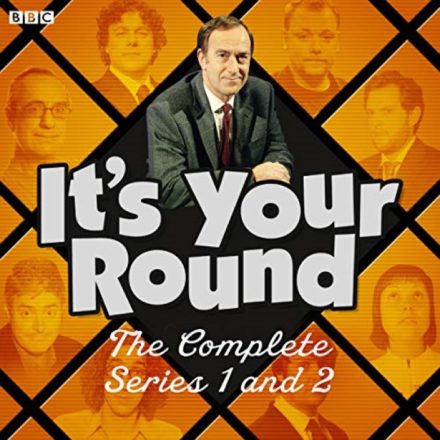Members get information about when streams/downloads become available, as well as accessing podcast RSS feeds for freely-available content to make listening to great shows a breeze, Register Here
Rigor Mortis ran for three series on BBC Radio 4 and is, to the best of my knowledge, currently legally unobtainable (which must make it even more popular, surely? Is a carefully limited supply of old comedies the BBC’s book-balancing plan B?). This is my prostitute’s howl of lament (see future review of In and Out of the Kitchen) for one of my all-time favourite dead sitcoms; seriously, show me that weird path up past the kitty graves and I’d be burying this review faster than you can say dirt.
I can’t think of any other sitcom set in a pathologists’ lab; Six Feet Under is about as close as I can call to mind, which was more dramedy than pure sitcom. It’s such a wonderful idea you could have wound up a handful of spoof stocks, let them go and still have a pretty serviceable comedy. Instead Howarth allowed his characters both latitude in their creation and development as the series ran, helped by a top-notch bunch of actors.
Professor Donaldson (Peter Davidson: over-enthusiastic pathologist who prefers the dead to the living) and Dr Ruth Anderson ((Tracy-Ann Oberman series 1, Matilda Ziegler series 2-3: desperately wants to be Professor Helen Whitwell) begin as nicely drawn, albeit somewhat broad characters, but with enough snap to keep the comedy dancing lightly along its subject matter. The real beauty of the show is that they are allowed to develop into people you both care for and want to see find happiness. There is a plotline about parenthood, coupledom and happiness with your life’s choices which is handled realistically for the characters in motion – and dips into waters a sitcom rarely touches.
Even Chloe (Marianne Levy: relentlessly upbeat admin) and Gordon (Tom Price: cheerful alcoholic lab assistant), despite being held in stasis by the necessities of the show, get some splendid payoffs. Notably the latter, who…well, it’s hard to avoid spoilers, but I’m hoping it won’t be held too hard against me for a show it doesn’t seem possible to currently listen to. Gordon spends the entire show cheerfully drinking himself into oblivion and back – including, on one occasion, sending himself ‘death threats’ (i.e. warnings about his current lifestyle), which he has blacked out the following day – until he dies because of it. It’s not a yukks moment, but it’s also not done with a full violin concerto. This guy lived like this, he died like this, and death is what these characters do every day. The whole series operates under those rules; it’s very black, and a bit rubber-sheet realistic (without wandering too far into surrealism), but it’s not crass.
The weakest character is probably the police liaison, Simon (Gus Brown), who is a bit of a cipher; he’s completely incapable of dealing with dead bodies and presented as a wimp and a loser. There’s one nice storyline in which he doesn’t have to deal with dead bodies for a period and regains some charisma and confidence; however he’s given much less to do with the role than the other cast members. He’s Drop the Dead Donkey‘s George, but as an outsider rather than a main member of the team.
There is also Geoffrey Whitehead as Professor Donaldson, who exists outside any requirements of character development or plot dynamics. My absolute favourite episode of the show is episode six, series two, in which the crew have to work Christmas day. Whitehead’s pronunciation of ‘Noël’ is worth whatever the entire show cost.
Sometimes, dead really is better.
Episode List
- S01E01 – The Citadel
- S01E02 – The Citadel
- S01E03 – The Citadel
- S01E04 – The Citadel
- S01E05 – The Citadel
- S02E01 – The Citadel
- S03E01 – The Citadel
- S03E02 – The Citadel
- S03E03 – The Citadel
- S03E04 – The Citadel
- S03E05 – The Citadel
- S04E01 – The Citadel
- S04E02 – The Citadel
- S04E03 – The Citadel
- S04E04 – The Citadel
- S04E05 – The Citadel
- S05E01 – The Citadel
- S05E02 – The Citadel
- S05E03 – The Citadel
- S05E04 – The Citadel
- S05E05 – The Citadel
- S06E01 – The Citadel
- S06E02 – The Citadel
- S06E03 – The Citadel
- S06E04 – The Citadel
- S06E05 – The Citadel




![The Stormlight Archive [03] Oathbringer](https://www.dimsdale.co.uk/wp-content/uploads/xtsao-440x440.jpg.pagespeed.ic.7Ji-MR0FsW.jpg)
![Scarlet City [1] Apprentice](https://www.dimsdale.co.uk/wp-content/uploads/sc1a-440x440.jpg)












